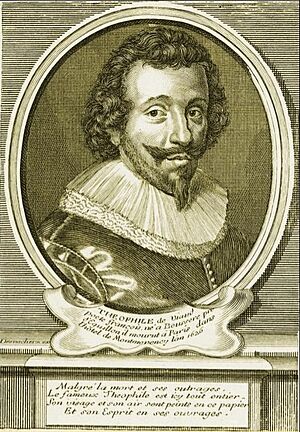Théophile de Viau facts for kids
Théophile de Viau (born in 1590 and died on September 25, 1626) was a French Baroque poet and writer of plays. He is known for his unique style and for facing challenges because of his ideas.
His Early Life and Challenges
Théophile de Viau was born in Clairac, a town near Agen in France. He grew up as a Huguenot, which was a type of French Protestant. From 1615 to 1616, he took part in some conflicts in Guyenne.
After these conflicts, he was forgiven and became a talented young poet at the royal court. Théophile learned about the ideas of an Italian thinker named Lucilio Vanini. These ideas, sometimes called "epicurean," questioned some common beliefs of the time.
Because of some of his views, de Viau was asked to leave France in 1619. He traveled to England but came back to the court in 1620. However, in 1623, a group called the Jesuits made accusations against him. He was put in prison.
While de Viau was hiding, a punishment was carried out without him being there. But he was eventually caught while trying to go back to England. He was then held in the Conciergerie prison in Paris for almost two years. His trial caused many discussions among thinkers and writers. Many short books were published, some supporting him and some against him.
His punishment was changed to being permanently sent away from France. Théophile de Viau spent his last months in Chantilly, protected by the Duke of Montmorency. He passed away in Paris in 1626.
What He Wrote
Théophile de Viau wrote many different kinds of poems, including funny ones called satirical poems, short poems called sonnets, and longer poems known as odes and elegies. He also wrote one play, called Les Amours tragiques de Pyrame et Thisbé (which means The Tragic Loves of Pyramus and Thisbe). This play, performed in 1621, tells the sad love story of Pyramus and Thisbe.
He also wrote a piece called Fragment d'une histoire comique (Fragment of a Comic Novel) in 1623. In this work, he shared his thoughts on writing. He didn't like the overly fancy or very academic style that some writers used back then. But he also didn't like the strict rules that other writers, like François de Malherbe, tried to put on poetry. This way of thinking, where he didn't follow all the rules, made him known as someone who liked to do things his own way.
His Unique Style
Théophile de Viau's poetry did not follow the strict, logical rules that François de Malherbe and others wanted. Instead, he preferred to show strong feelings and use vivid, imaginative pictures, much like the art style of the Baroque period.
For example, in his ode Un corbeau devant moi croasse (A crow before me caws), he creates a wild scene with thunder, snakes, and fire. This is similar to the dramatic paintings by artists like Salvator Rosa. Some of his poems are sad requests to the king about his time in prison or being sent away. This feeling of sadness is also in his ode On Solitude, which combines old stories with a poem about the poet alone in a forest.
Théophile de Viau's works were "rediscovered" by French writers in the 1800s who were part of the Romantic movement.
Depictions
Théophile de Viau appears in Roberto Rossellini's film Descartes. In the movie, he meets the famous philosopher Descartes in Paris before Descartes leaves for Holland in 1618.
See also
 In Spanish: Théophile de Viau para niños
In Spanish: Théophile de Viau para niños
 | Frances Mary Albrier |
 | Whitney Young |
 | Muhammad Ali |


